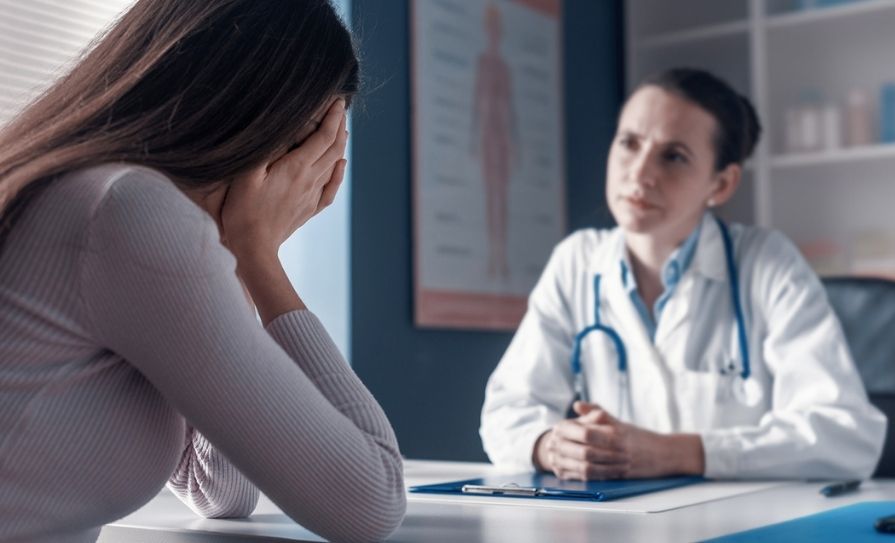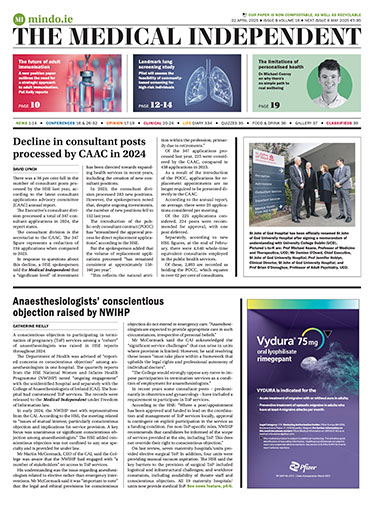This is a time of significant flux in the area of sexual health policy.
In August, the HSE launched the #respectprotect sexual health campaign. The initiative replaced ‘Johnny’s Got You Covered’, which started in mid-2012. It comes at a time when the HSE’s Sexual Health and Crisis Pregnancy Programme (SHCPP) will have extended duties with the planned roll-out of abortion services in the new year and the Minister for Health Simon Harris is planning to introduce a pre-exposure prophylaxis (PrEP) programme later in 2019. Also, the National Sexual Health Strategy 2015-2020 has now been in place for three years and continues to set the agenda in the area.
The HSE is on the search for a new Clinical Lead in Sexual Health following the recent departure of Dr Fiona Lyons from that position.
“The secondment of a Clinical Lead in Sexual Health ended on 30 September 2018. There will be an open HSE recruitment process in place to fill this position,” an Executive spokesperson told the Medical Independent (MI).
There are also varying trends in the area of sexual health and linked issues. For example, teenage pregnancies are going down (see panel, page 5), while doctors are reporting that sexually-transmitted infections (STIs) are an increasing challenge (see panel, right).
The anecdotal evidence from doctors of a serious rise in STIs is backed by the stats. Health Protection Surveillance Centre (HPSC) data shows that in 2017, there were 5,200 cases of young people diagnosed with either chlamydia (n=3730), gonorrhea (n=872) or genital herpes (n=598), representing an 11.2 per cent increase in these STIs in this age group (15-to-24) when compared to 2016 figures.
Partly in response to these developments, the HSE has recently launched a new approach to sexual health communications.
This new approach is aimed at all people living in Ireland and brings together one identity and one new website, www.sexualwellbeing.ie.
Arguably, the highest-profile change in the messaging is the replacement of the ‘Johnny’s Got You Covered’ campaign with #respectprotect, which is aimed at young people.
Heteronormative
“It is a changing time in Ireland,” Ms Helen Deely, HSE Programme Lead, Sexual Health and Crisis Pregnancy, told MI.
“The research told us that people wanted the HSE to be a trusted resource, that we should provide information to everybody, that the information we provide should be more positive. It should support people around their sexual health, STI prevention, and crisis pregnancy prevention.
“Johnny was seen as ‘heteronormative’, [the campaign] was beginning to wear out. It was time to change.”
‘Heteronormative’ is defined as denoting or relating to a world view that promotes heterosexuality as the normal or preferred sexual orientation.
Ms Helen Deely, HSE
Does this mean the new #respectprotect campaign is more consciously aimed at all young people, no matter their sexual orientation?
“Absolutely. The new campaign was really to complement and support our new website, sexualwellbeing.ie. The website reaches everybody, no matter what their sexual orientation is. With #respectprotect, its main message is to promote condom use, targeted at 18-to-30 year-olds.”
What the doctors order
Doctors working on the frontline of sexual health report significant challenges in the field.
“First thing to appreciate here, is that we are just seeing a flood of infections at the moment,” Dr Derek Freedman, a specialist in sexual health and sexually-transmitted infections, based in Ranelagh, Dublin, told MI.
“There has been a flood of infections with gonorrhea and syphilis; there is absolutely no public awareness of this.”
He said there was serious need to “engage the public and media on what is actually happening”.
“I mean, for instance, I’m seeing mornings now where you see two or three cases of gonorrhea; I wouldn’t have seen that in a year 20 years ago.
“We are seeing new cases of syphilis. Basically, a huge surge of infections.”
Dr Freedman said PrEP is a “very good tool to prevent HIV infection”.
“But the problem is when people are no longer afraid of HIV, they are taking significant sexual risks.”
Dr Freedman believes a continuing rise in the economic fortunes of the country could also lead to more STIs. Regarding the HSE’s new sexual health message of #respectprotect, Dr Freedman was sceptical that this will be effective.
“How directly is that message actually speaking to people?” he asked.
Regarding international experience, Dr Freedman said in the UK and US, there is an increasing push to move sexual health clinics into the community.
“Currently, we [in Ireland] are providing sexual health services in a hospital environment. A lot of the innovation that is taking place in the last five years in London and New York is about bringing the specialist services out into the community,” he said.
“So people can get tested on the spot, get the results within the hour. You actually have to reach out into the community and have a strong public message that takes cognisance of the target audience.”
FEMPI
Dr Deirdre Lundy, ICGP co-ordinator of reproductive and sexual health courses, told MI that from her own experience across the country, the level of service in sexual health is mixed and she has serious concerns over the lack of a co-ordinated sexual health policy.
“It seems very piecemeal to me and travelling around the country delivering lectures to GPs and nurses in all the various jurisdictions, it amazes me how variable services are,” Dr Lundy said.
“Most sexual health is supposed to be carried out in primary care but the 40 per cent FEMPI cuts have made that next to impossible to deliver adequately.
“Free ultrasounds for women with gynaecological complaints are almost unattainable in some areas.”
Dr Lundy also raised concerns over waiting lists for pelvic scans in some hospitals.
“Some hospital labs don’t process STI samples at all and they need to be posted to the NVRL [National Virus Reference Laboratory] in Dublin,” she said.
“Free STI screening is not available at all through primary care for non-medical card holders, but should be. It is not even free in all third-level colleges and universities — that’s a no-brainer.
“There is no provision of free contraception for non-medical card holders at all, except one fantastic initiative in Donegal town that I have heard of.”
Ms Helen Deely, HSE Programme Lead, Sexual Health and Crisis Pregnancy, insisted that doctors — especially public health doctors and GPs — have a crucial role to play in the #respectprotect campaign and the promotion of sexual health in general.
“So we have a Clinical Lead in the programme who feeds into all our work and campaigns,” Ms Deely said.
“We work very closely with doctors, GPs, in terms of sexual health and supporting them around sexual health promotion.
“So we support things around funding the provision of workshops in long-acting reversible contraceptive and around an STI e-learning module. For us, doctors are key in terms of engaging people around positive sexual health when they get the opportunity. In terms of promoting contraception, best use, best choice.
“Promoting STI testing, making sure people get tested frequently, if they have had unprotected sex [are important]. So doctors are absolutely key and we are engaged with public health doctors all the time in terms of our messaging campaign and outreach work.”
Dr Deirdre Lundy
Review
The company Target McConnells conducted the review of the HSE’s sexual health communications strategy, including the ‘Johnny’s Got You Covered’ campaign. It was in this review that Johnny’s character was first deemed ‘heteronormative’. The review cost €45,368 (inclusive of VAT), according to figures supplied to this newspaper.
“It was time to take stock, with a new national sexual health strategy having been published in 2015, and ongoing social, legislative and cultural change in the intervening years,” a HSE spokesperson told MI when commenting on the review.
“The ‘Johnny’s Got You Covered’ campaign was performing well with some audiences in terms of engagement, but like all media campaigns, was showing signs of ‘wear-out’ — where an audience has begun to be disinterested by the messages, and also, critically, it was seen as heteronormative and not a good fit with the whole population, particularly LGBTI+ and men who have sex with men (MSM), and so had probably maximised its effectiveness,” said the spokesperson, repeating many of the main points contained in the Target McConnells review. The review has been seen by MI following a Freedom of Information request.
Following the completion of the review, a competition was opened to choose a company to design and run the HSE’s new sexual health campaign.
In the end, the agency Ebow was awarded the contract. This newspaper has learned that the contract awarded to Ebow was for €90,000 (including VAT). The contract is once-off and is not for a specific timeframe. Ebow was commissioned to establish an overall identity for HSE sexual health communications on all topics, with www.sexualwellbeing.ie as the hub, the #respectprotect campaign and to develop communications materials and campaign resources to support the HSE’s new crisis pregnancy phone line, due to be launched in January 2019.
The new campaign has already garnered some praise.
“We commend that the HSE have brought in the #respectprotect campaign, with the aim to have a more inclusive and accessible service,” Union of Students in Ireland (USI) Vice President for Welfare Mr Damien McClean told MI.
“Sexual health campaigns need to be appealing to students, and inclusive of all students, and the campaign has the aim of doing that.”
Mr McClean said he believed that the “campaign is an advancement on the ‘Johnny’s Got You Covered’ campaign and gives the HSE the platform to discuss important issues, such as abortion care and LGBTI+ health, which was not easily done with the ‘Johnny’s Got You Covered’ branding.”
Education
While the USI Vice President is positive about the work that the HSE is currently doing with regard to sexual health education, he believes the Department of Education could play a greater role in the area.
“The HSE are adapting to the needs of students and we need the Government to follow suit,” said Mr McClean.
“We need to have more inclusive sexual education in schools, frameworks to allow for consent information at third level, and suitable, affordable and accessible abortion services. Ireland has matured in the last decade in the way we discuss sexual health and we need policy and structures to reflect that.”
There is currently a major review of the relationships and sexuality education (RSE) curriculum across Irish schools.
The review “covers content of RSE curriculum, support materials and the delivery of the curriculum. Some areas of focus are consent, contraception, healthy, positive sexual expression and relationships, safe use of the Internet, social media and its effects on relationships and self-esteem and LGBTQ+ matters,” a spokesperson for the Department of Education said.
“The Minister [for Education] is expected to receive a report on the review of sex education by the middle of next year.”
Abortion
Minister for Health Simon Harris again recently promised that new abortion legislation will be passed before the end of the year, and abortion services should be rolled-out in January.
Some GPs, opposition politicians and others have questioned the tightness of the timeline.
The new legislation will mean a significant increase in the services provided by the HSE’s sexual health programme, but Ms Deely insisted they are ready for it.
“So the next element of the campaign linked to our website is around a freephone counselling service that we will be launching at the beginning of January,” according to Ms Deely.
“That is around supporting women in terms of crisis pregnancy, providing counselling information and also access to where they can get abortion services and online help.
“Counsellors will provide support to women or anybody around a pregnancy and also information in terms of abortion, what the process is for abortion, and where they can access abortion services locally.”
Asked whether the legalisation of abortion pills will lead to any alteration in the Executive’s sexual health messaging campaign, Ms Deely pointed to the work of the phone line as the main area of change.
“That [phone line] will be staffed by counsellors and then there will also be a nurse element… in case women have any queries or any complications [about] having taken abortion pills, or are concerned about anything. So there will be access to a nurse 24/7 as well,” she said.
“So we have contracted that service and we are assured that it will be in place in time. We will respond to the volume in terms of upping the staff number if that is required.”
PrEP
Next year could see some significant advancements in the area of PrEP.
A spokesperson for the Department of Health told MI that moves could be made “early next year”.
“The Health Information Quality Authority (HIQA) was asked by the Government to carry out a health technology assessment of introducing a PrEP programme in Ireland for populations at substantial risk of sexual acquisition of HIV. The aim is to establish the clinical and cost-effectiveness of providing a PrEP programme in Ireland,” according to the spokesperson.
“Considerable work has already been completed by the HSE to prepare for the introduction of a PrEP programme that meets appropriate standards.”
The spokesperson said HIQA’s work is due to conclude by early next year and the Minister “looks forward to advancing policy” then.
“The main new initiative we would like to see is the introduction of PrEP being made available on the medical card, and the accompanying health monitoring supports being fully funded,” Mr Niall Mulligan, Executive Director, HIV Ireland, told MI when asked what new policies the group would like to see in sexual health.
Separately, Mr Mulligan said “we would also like to see the issue of HIV-related stigma being examined in greater detail, with greater resources being allocated towards counselling and social supports for people living with HIV.
“A national campaign highlighting the U=U message [the international undetectable = untransmittable campaign] would also be a crucial part of this initiative.”
In terms of what is working well with HSE policy in this area, Mr Mulligan points to progress with access to HIV/STI testing.
“We believe there is a genuine commitment towards increasing access to community-based HIV/STI testing and we have seen some progress in that regard,” he said.
“However, more needs to be done in resourcing this initiative. For example, in 2017, HIV Ireland’s testing services catered for 1,082 people. However, we had to turn away a further 384 people because we did not have the resources to provide a service to them.”
Number of teenage pregnancies declining
In May, the Sexual Health and Crisis Pregnancy Programme announced and welcomed a further decline in the number of births to teenagers, from 1,098 in 2016, to 1,041 in 2017.
Births by teenagers have decreased from 3,087 in 2001 to 1,041 in 2017; a decline of 66 per cent over the 16-year period. This equates to a decrease in the teenage birth rate, from 20 per 1,000 of women aged 15-to-19 in the population in Ireland in 2001, to 6.9 per 1,000 in 2017.
“From our perspective, the reasons for this [decline] are probably multiple. But really, we think the relationships and sexuality education in schools has been key. We have worked closely with the Department of Education around delivery of relationship sexuality education in schools, and young people are much more informed,” Ms Helen Deely, HSE Programme Lead, Sexual Health and Crisis Pregnancy, told MI.
“They are much better at taking care of their sexual health. They are much better at wearing condoms; there is greater knowledge with young people around looking after themselves.
“There are a few other elements. We have the availability and acceptance of contraception and we also have the availability of the morning-after pill over the counter, so there are probably a number of elements around it.
“Young people are having more open conversations with their parents and they are able to ask questions and get accurate information.”
Will the present trend continue?
“Lots of trends just peak…lots of trends just continue on a downward curve and then they can probably remain flat,” Ms Deely said. “But we are certainly lower than the UK in terms of our teenage pregnancy rate. But there will be a stage where it will plateau, and then it may just stay at that level for a while, and not go down any further.
“The downward trend has been great, but very soon it could probably plateau-out. So it’s about doing more targeted things; now that we have seen the more reduced trends, maybe we can focus on more vulnerable young people. It’s really about making sure we target the younger people most at risk.”













Leave a Reply
You must be logged in to post a comment.